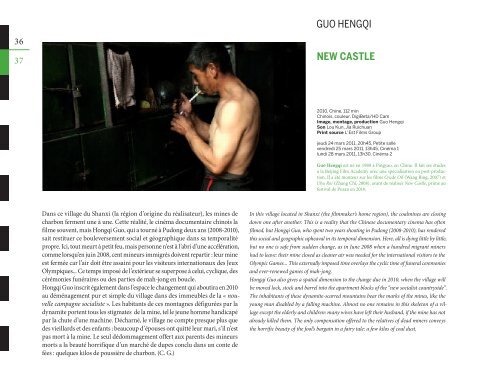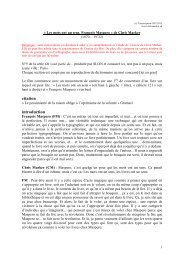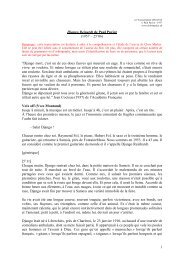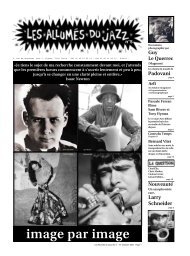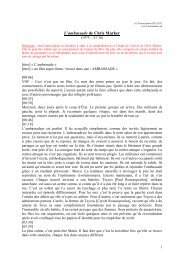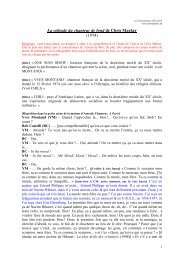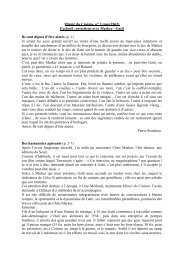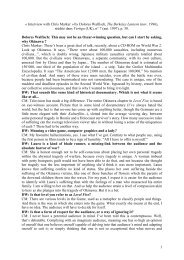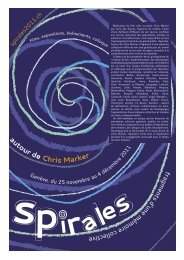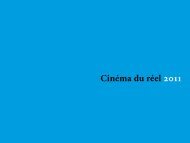3637Guo HengqiNew Castle2010, Chine, 112 minChinois, couleur, DigiBeta/HD CamImage, montage, pro<strong>du</strong>ction Guo HengqiSon Lou Kun, Jia RuichuanPrint source L’ Est Films Groupjeudi 24 mars <strong>2011</strong>, 20h45, Petite sallevendredi 25 mars <strong>2011</strong>, 13h45, Cinéma 1lundi 28 mars <strong>2011</strong>, 13h30, Cinéma 2Guo Hengqi est né en 1980 à Pingyao, en Chine. Il fait ses étudesà la Beijing Film Academy avec une spécialisation en post-pro<strong>du</strong>ction.Il a été monteur sur les films Crude Oil (Wang Bing, 2007) etUbu Roi (Zhang Chi, 2008), avant de réaliser New Castle, primé aufestival de Pusan en 2010.Dans ce village <strong>du</strong> Shanxi (la région d’origine <strong>du</strong> réalisateur), les mines decharbon ferment une à une. Cette réalité, le cinéma documentaire chinois lafilme souvent, mais Hongqi Guo, qui a tourné à Pudong deux ans (2008-2010),sait restituer ce bouleversement social et géographique dans sa temporalitépropre. Ici, tout meurt à petit feu, mais personne n’est à l’abri d’une accélération,comme lorsqu’en juin 2008, cent mineurs immigrés doivent repartir : leur mineest fermée car l’air doit être assaini pour les visiteurs internationaux des JeuxOlympiques... Ce temps imposé de l’extérieur se superpose à celui, cyclique, descérémonies funéraires ou des parties de mah-jong en boucle.Hongqi Guo inscrit également dans l’espace le changement qui aboutira en 2010au déménagement pur et simple <strong>du</strong> village dans des immeubles de la « nouvellecampagne socialiste ». Les habitants de ces montagnes défigurées par ladynamite portent tous les stigmates de la mine, tel le jeune homme handicapépar la chute d’une machine. Décharné, le village ne compte presque plus quedes vieillards et des enfants : beaucoup d’épouses ont quitté leur mari, s’il n’estpas mort à la mine. Le seul dédommagement offert aux parents des mineursmorts a la beauté horrifique d’un marché de <strong>du</strong>pes conclu dans un conte defées : quelques kilos de poussière de charbon. (C. G.)In this village located in Shanxi (the filmmaker’s home region), the coalmines are closingdown one after another. This is a reality that the Chinese documentary cinema has oftenfilmed, but Hongqi Guo, who spent two years shooting in Pudong (2008-2010), has renderedthis social and geographic upheaval in its temporal dimension. Here, all is dying little by little,but no one is safe from sudden change, as in June 2008 when a hundred migrant minershad to leave: their mine closed as cleaner air was needed for the international visitors to theOlympic Games... This externally imposed time overlays the cyclic time of funeral ceremoniesand ever-renewed games of mah-jong.Hongqi Guo also gives a spatial dimension to the change <strong>du</strong>e in 2010, when the village willbe moved lock, stock and barrel into the apartment blocks of the “new socialist countryside”.The inhabitants of these dynamite-scarred mountains bear the marks of the mines, like theyoung man disabled by a falling machine. Almost no one remains in this skeleton of a villageexcept the elderly and children: many wives have left their husband, if the mine has notalready killed them. The only compensation offered to the relatives of dead miners conveysthe horrific beauty of the fool’s bargain in a fairy tale: a few kilos of coal <strong>du</strong>st.
Marco SantarelliScuolaMediaJunior High2010, Italie, 77 minItalien, couleur, DigiBetaImage Alfredo FarinaSon Alfredo Farina, Marco SantarelliMontage Marco SantarelliMusique Danilo CaposenoPro<strong>du</strong>ction, print source OttofilmakerCompétition InternationalePremiers Filmssamedi 26 mars <strong>2011</strong>, 12h30, Cinéma 1dimanche 27 mars <strong>2011</strong>, 12h45, Petite sallevendredi 1 er avril <strong>2011</strong>, 12h15, Petite salleMarco Santarelli est né à Rome en 1971. Vidéaste indépendantpendant plusieurs années. En 2009, il réalise GenovaTripoli,premier chapitre d’une trilogie sur le monde des transports, quiremporte le premier Prix au Tekfestival de Rome.Scuola media : le vocable italien pour « collège » place cette institution aumilieu <strong>du</strong> chemin qui mène de l’enfance à l’âge a<strong>du</strong>lte. Ce carrefour <strong>du</strong>cursus scolaire est aussi un point de vigie privilégié sur une communauté.De l’élève Antonio qui, interrogé sur ce qu’est la loi, répond : « une brochure», à une mère d’élève qui explique à l’administration que ses enfantss’absentent de l’école pour rester avec elle car elle n’a « pas de mémoire », lesbribes enten<strong>du</strong>es dans les couloirs ou sur l’estrade renvoient au hors-champ,au dehors de l’établissement. ScuolaMedia n’est donc pas un documentairede plus « sur » le système é<strong>du</strong>catif. Il se poste, yeux et oreilles ouverts, danscette caisse de résonance.Or le collège Pirandello n’est pas situé n’importe où en Italie. Tarente, dansles Pouilles, est un haut-lieu de l’in<strong>du</strong>strie métallurgique européenne, maisses aciéries tuent à petit feu les habitants, ré<strong>du</strong>its à choisir entre pollution etpaupérisation. Par un montage accumulant les scènes brèves, Marco Santarellitrame dans le quotidien scolaire une inquiétude. En cours de musique,on entend une chanson sur les « silhouettes des usines ». Dans une autre classe,il est fait référence à l’ILVA (la société publique qui gère les hauts-fourneaux)…Est-ce un hasard s’il est question d’Enfer en cours de religion ? (C. G.)Scuola media: the Italian for “Junior high”, places this institution halfway along the pathfrom childhood to a<strong>du</strong>lthood. This e<strong>du</strong>cational crossroads is also a privileged vantage pointfor observing a community. From the schoolboy Antonio who, when asked what the law is,replies: “a brochure”, to the mother who explains to the administration that her childrenskip school to stay home with her as she has “no memory”, the snatches of conversationheard in the corridors or in the classroom evoke the off-screen world, away from school.ScuolaMedia is thus not just one more documentary “on” the e<strong>du</strong>cation system. It setsitself up, with open eyes and ears, to echo the Italian society.And the Pirandello Junior high is not located just anywhere in Italy. Taranto, in Apulia,is a hub of the European steel in<strong>du</strong>stry, but its steelworks are slowly killing the inhabitants,re<strong>du</strong>ced to choosing between pollution and pauperisation. By editing a succession ofshort scenes, Marco Santarelli weaves anxiety into daily life at school. In the music lesson,we hear a song about the “factory silhouettes”. In another class, mention is made of theILVA (the state company that runs the blast furnaces)… Is it a coincidence that Hell isdiscussed in the religion class?
- Page 3 and 4: Cinéma du réelremercie toutpartic
- Page 5 and 6: Patrick BazinDirecteur de la BpiBib
- Page 7 and 8: Guy SeligmannPrésident de laScamSo
- Page 9 and 10: Claude LemeslePrésident duConseild
- Page 13 and 14: Autres jurys13Le Jury des jeunes, c
- Page 15 and 16: Compétition internationaleCompéti
- Page 17 and 18: Ruth BeckermannAmerican Passages17C
- Page 19 and 20: Claudio PazienzaExercices de dispar
- Page 21: Lee Anne SchmittThe Last Buffalo Hu
- Page 24: 2425Ariane DoubletLa Pluie et le be
- Page 30: 3031Olga MaurinaDomHome2011, Russie
- Page 33 and 34: Bettina BüttnerKinderKids2011, All
- Page 35: Filipa ReisJoão Miller GuerraNuno
- Page 39 and 40: Michele PennettaI Cani abbaianoThe
- Page 41 and 42: juan Manuel SepúlvedaExtraño rumo
- Page 43 and 44: Javier LoarteMe llamoRoberto Delgad
- Page 45 and 46: Vania AillonLa Terre tremble2011, S
- Page 47: Mehdi BenallalAux rêveurstous les
- Page 50 and 51: Matthieu ChatellierDoux amer5051201
- Page 53 and 54: Gaël LépingleJulien2010, France,
- Page 55 and 56: Sophie BruneauMarc-Antoine RoudilMa
- Page 57 and 58: Marie DumoraLa Place2011, France, 1
- Page 60: News From…Patrick KeillerNicolás
- Page 63 and 64: Verena Paravel, J.P. Sniadeckisamed
- Page 65 and 66: 2010, Chine, 356 minMandarin, coule
- Page 67 and 68: Séancesspéciales10. Mythologie ou
- Page 69 and 70: Andrei Ujică,La révolution, live1
- Page 71 and 72: 2010, Roumanie, 180 minRoumain, cou
- Page 73 and 74: 1993, États-Unis /Italie, 55 minHi
- Page 75 and 76: Leo HurwitzAmerica never was Americ
- Page 77 and 78: Leo Hurwitz #1samedi 26 mars 2011,
- Page 79 and 80: Leo Hurwitz #3jeudi 31 mars 2011, 1
- Page 81 and 82: Richard LeacockRichard Leacock aura
- Page 83 and 84: Dédicace Richard Leacocksamedi 2 a
- Page 85 and 86: Les outils du cinéma documentaire
- Page 87 and 88:
Camera #3 Pierre Lhomme, Renato Ber
- Page 89 and 90:
Dédicaces& Ateliers
- Page 91 and 92:
Le poème documentaireLe 28 octobre
- Page 93 and 94:
Exploring documentary #2 Rudy Burck
- Page 96 and 97:
Exploring documentary # 5 Helga Fan
- Page 98 and 99:
Exploring documentary #7 Leighton P
- Page 100 and 101:
Exploring documentary #9 Odes ciné
- Page 103 and 104:
1994 et 2001, France, 8 minFrançai
- Page 105 and 106:
Thanks for the American dream,To vu
- Page 107 and 108:
1931, États-Unis, 11 minCartons an
- Page 109 and 110:
1935, États-Unis, 6 minCartons ang
- Page 112 and 113:
Réalisateur inconnuProtestExtrait
- Page 116 and 117:
Écoute Voir !Hors scèneAvec le so
- Page 118 and 119:
Hors scène #2jeudi 31 mars 2011, 1
- Page 120:
Hors scène #5samedi 2 avril 2011,
- Page 123 and 124:
Hors scène #10dimanche 3 avril 201
- Page 125 and 126:
Lech Kowalski : Underground Rock St
- Page 127 and 128:
Le cinéma est parfois invisible.Ce
- Page 129 and 130:
Adriano Aprà Historien du cinéma,
- Page 131 and 132:
Était-ce un téléfilm ? Un oubli
- Page 133 and 134:
¹de connaître les films du Hollan
- Page 135 and 136:
Freddy BuacheAncien conservateur de
- Page 137 and 138:
¹Vincent Dieutre CinéasteLe film
- Page 139 and 140:
¹c’était une manière de miracl
- Page 141 and 142:
Mon film et l’entretien ont été
- Page 143 and 144:
¹au paysage urbain de New York, le
- Page 145 and 146:
¹Eric Le Roy Chef du service Accè
- Page 147 and 148:
¹Marcel Lozinski CinéasteA la rec
- Page 149 and 150:
¹surgissent quand on les a cherch
- Page 151 and 152:
¹contenu réaliste, voire ethnogra
- Page 153 and 154:
¹Errere errera…Je suis en voyage
- Page 155 and 156:
¹teur, je suis presque sûr que se
- Page 158 and 159:
158159Peter von Bagh Cinéaste, his
- Page 160 and 161:
Mémoire du réel
- Page 162 and 163:
Les 20 ans du Prix Louis Marcorelle
- Page 164 and 165:
Rencontres et événements
- Page 166 and 167:
Soirée Video et Après / Cinéma d
- Page 168 and 169:
Rencontres et débats168169Rencontr
- Page 170 and 171:
Forum AddocQuand le documentairereg
- Page 172 and 173:
172173Séances hors les mursCENTRE
- Page 174 and 175:
176177Index des réalisateursAAbi S
- Page 176 and 177:
178KGP Kranzelbinder GabrieleProduc
- Page 178:
180181L’ équipe du Cinéma du r


